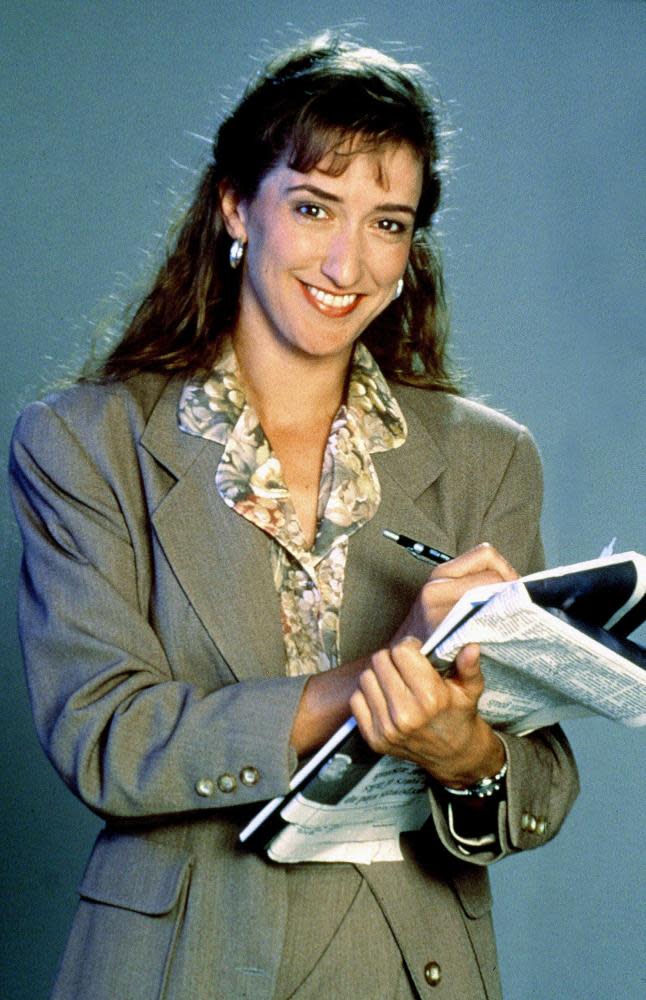Haydn Gwynne was an inquisitive actor, charismatic company – and great fun
Haydn Gwynne, who has died aged 66, was often privately described by admiring co-stars and directors as “Britain’s Bette Davis”. That would have thrilled her, as she admitted to seeking out modern equivalents of the independent, sardonic, cynical, seductive characters pioneered by the American star.
Whether as TV news editor Alex in Drop the Dead Donkey from 1990-91; a joyously parodic, chain-smoking, Charles-baiting Camilla in The Windsors (2016-23); or the dance teacher Mrs Wilkinson in stage versions of the musical Billy Elliot (London in 2005 and Broadway in 2008), Gwynne was notable for flash-glances, paying homage to that quality in her acting heroine which was immortalised in Kim Carnes’ 1981 hit Bette Davis Eyes.
With those dark stares, tall frame and long, thin face, Gwynne once joked that her career was a constant fight not to be cast as the elegantly vicious Cruella de Vil in versions of 101 Dalmatians. Instead she found numerous more original alternatives throughout a career that accelerated after two TV roles at the turn of the 1990s.
In 1989 she was cast in a four-part BBC2 adaptation of Nice Work, David Lodge’s Booker-shortlisted novel about a scheme in which a business leader and an academic shadow each other in their workplaces in the hope of bringing commerce and art closer. Gwynne played the leftwing feminist English lecturer Robyn Penrose, opposite Warren Clarke as Tory patriarch Vic Wilcox. It was vanishingly rare for a female TV character to be much taller and more intelligent than the opposite man, and Gwynne won their clashes on politics and economics with grand slam-quality smashes and spin.
In his memoir Writer’s Luck, Lodge recalls that Emma Thompson was originally courted for the role of Robyn, but dropped out. The author was initially concerned by the substitution of the “completely unknown” Gwynne but soon found her “perfect”. She crucially brought to the role a powerful intelligence; a graduate of Nottingham University, she had taught English at an Italian university during some gap years prior to becoming an actor in her mid-20s.
Still considered one of the best TV dramas, Nice Work led to four decades of just that, during which Gwynne’s fame and TV recognisability were helped by a name as striking as her face. (While widely assumed to be Welsh, her distinctive screen credit was an adaptation from her Irish father, Guy Thomas Hayden-Gwynne.)

The year after Nice Work, she was cast in Drop the Dead Donkey. Sealing Gwynne’s reputation as a portrayer of strong women, Alex, when visited by her ex-husband in the GlobeLink newsroom, punched him in the face. That and other memorable scenes won Gwynne a Bafta nomination. Her third major recurring TV role was as a senior female police officer at a time when that was still a relative rarity: Supt Susan Blake in the first three series of Merseybeat. During that period, Gwynne’s partner, Jason, a therapist, and two sons, Jason and Harrison – always cores of her life – relocated from London to Cheshire to be close to location.
As she had with Drop the Dead Donkey, Gwynne left Merseybeat while it was still running – always an act of confidence in an unreliable profession. But she was constantly in demand, as a rare talent able to move between TV, theatre and radio; drama, comedy and musicals. After singing and dancing in Billy Elliot, she was a memorable Margaret Thatcher – another of her surrogate Cruella de Vils – in Peter Morgan’s stage play The Audience (2013), a precursor to The Crown, in which, last year, she played Lady Susan Hussey, a lady in waiting to the Queen who was married to BBC chairman Sir Marmaduke Hussey during the controversy over Prince Diana’s Panorama interview. Although Gwynne had only a handful of scenes – and lamented the cutting of some improvised comic bedroom business involving Marmaduke Hussey’s prosthetic leg – she characteristically burned off the screen.
Her deep voice, moving easily from regal to regional, was equally versatile and recognisable. I was lucky enough to have her cast in several of my radio plays, a minor part of her CV that I mention only because of the illuminating privilege of seeing a brilliant actor close up. She would gently but precisely identify failures of characterisation or language and then perfectly deliver the emergency new lines at first sight. When she played wives or mothers, she always asked what their job was, once telling me she would find it very difficult to portray a woman who didn’t work – which seemed telling of her personality, politics and professional fight against stereotyped roles. When a script included a woman who was more intelligent and competent than every man in Whitehall, the director Eoin O’Callaghan said one word: “Haydn.”
Between scenes and at lunch, she was fun, funny, endlessly curious, and sometimes furious about politics and culture. During the lockdown she took part in an unpaid Zoom reading of a Covid-delayed script, visibly leading and lifting a group of depressed and unemployed actors with her enthusiasm and wit.
A loss that would have been devastating in any circumstances to her family and many friends inside and outside showbiz is made worse by her death coming only six weeks after she was forced to drop out of Old Friends, a West End tribute to the composer Stephen Sondheim, following a cancer diagnosis during rehearsals. In a 2022 one-off charity performance try-out of Old Friends, Gwynne’s duet with Rob Brydon on The Little Things We Do Together, a marital stand-off from Company, perfectly suited her sarcastic charisma; she had relished doing it again.
In any party, Gwynne was a performer who left the audience happily anticipating the warning Davis famously gave in All About Eve: “Fasten your seats, it’s going to be bumpy night!”


